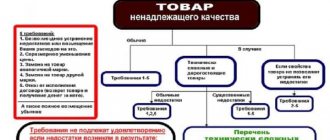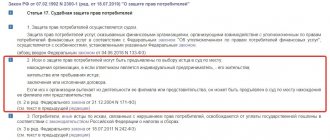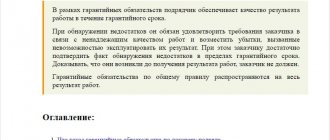Conditions and terms for returning or exchanging technically complex goods
A technically complex product is a durable product that has a complex internal structure. Decree of the Government of the Russian Federation dated November 10, 2011 No. 924 (as amended on September 17, 2016) approved a list of technically complex goods.
Current legislation determines a special procedure for the return or exchange of such products. In particular, this type of goods can be returned to the seller if there are deficiencies or defects that arose not through the fault of the consumer. In this case, goods of proper quality cannot be returned, even if according to some criteria they are not suitable for the buyer.
If defects are found in a technically complex product, it is definitely subject to return or exchange , but with some nuances.
1. Article 18 of the Law on the Protection of Consumer Rights allows you to return technically complex products to the seller if any, even minor, minor defect is detected - within 15 days from the date of purchase (the day of purchase itself is not taken into account). In this case, the seller must accept the goods and return the money paid for it, and, if necessary, check the quality of the goods, or, in case of doubt as to the causes of the defect, conduct an examination of the quality of the goods at his own expense.
2. If a consumer contacts a store with a defective item after 15 days from the date of purchase, the goods can only be accepted if one of the following conditions is met :
- A significant product defect has been discovered.
- The buyer previously submitted a demand to the seller to eliminate defects in the goods, but the defects were not eliminated within the legal time frame
- The product could not be used for a total of more than 30 days during each year of the warranty period due to repeated elimination of various defects.
This is an exhaustive list of reasons why you can return a technically complex product 15 days after purchase.
Consumer rights lawyer in St. Petersburg. Tel.+7 Telephone consultation
Article 18. Consumer rights when defects are discovered in a product
The consumer also has the right to demand replacement with the same product of another brand (model, article) with a corresponding recalculation of the purchase price. In this case, the legislator showed excessive brevity because he did not indicate how the term “same” should be understood. If we take it literally, it turns out that it must be a product of the same brand, model or article, but the text of the norm itself says otherwise. Thus, we have to conclude that the product that must be provided to the consumer for exchange must have a certain number of identical properties with the exchanged one. The category of identity in this case is evaluative, and in each case it is necessary to determine individually whether the product required for exchange is “the same.”
A proportionate reduction in price that a consumer may demand should be understood as a reduction by the difference between the purchase price and the market price of the same product, which has the same defects or does not have the same properties that the product lacks due to its defect. It should be remembered that the lack of a product is not always a consequence of any defect; often a completely serviceable product does not perform certain functions, the presence of which is assumed upon sale.
In addition, the consumer may demand immediate, free of charge elimination of defects in the product or reimbursement of costs for their correction by the consumer or a third party. The commented norm, on the one hand, establishes the obligation of the person to whom the corresponding demand is presented, to eliminate the existing defect, that is, a defect, the presence of which usually does not pose a problem, and on the other hand, to compensate for the costs of eliminating the defect, which at the time the demand is presented no longer exists, there are, at best, only traces of its occurrence and, possibly, elimination. Eliminating a defect very often leads to the fact that it becomes very difficult to find out both the fact of the presence of a defect in a product and the reasons for its occurrence. Therefore, the consumer, when deciding to eliminate a defect personally or with the involvement of third parties, must understand that the burden of proving the existence of a defect in any case lies with him, and if he eliminates this defect independently, this task can be significantly complicated. At the same time, the burden of proving the fault of the consumer himself in the occurrence of a defect, if the defect is discovered within the warranty period, lies with the person to whom the claim for reimbursement of repair costs is addressed, regardless of whether this person, the consumer or a third party eliminated the defect.
Another option for consumer behavior may be to refuse to execute the sales contract and demand a refund of the amount paid for the goods. In this case, at the request of the seller and at his expense, the consumer must return the goods with defects. In this case, the legislator used an extremely unfortunate formulation, since it used the conjunction “and”. In fact, the consumer can only refuse to fulfill the contract, which at the time of presentation of the demand has not yet been fulfilled, and at the same time demand a refund. In the same case, if the contract is fulfilled at the time the demand is presented (and this is almost always the case, with the exception of cases of sale of goods with deferred payment), it turns out that the consumer can neither refuse to fulfill the contract nor demand a refund of the money paid for the product, since the use of the specified conjunction “and” means that these requirements can only be stated together.
However, during the entire period of validity of the Law, judicial practice developed as if the text of the commented norm used the conjunctions “and/or”. The courts satisfy the demands of consumers, regardless of whether the contract has been fulfilled at the time the demand for a refund is presented or not.
The seller is obliged to either independently pick up the defective goods from the consumer or pay his costs for delivering the goods to the seller.
In accordance with paragraph 5 of Article 503 of the Civil Code, when returning to the buyer the amount paid for the goods, the seller does not have the right to deduct from it the amount by which the value of the goods has decreased due to full or partial use of the goods, loss of their marketable appearance or similar circumstances.
In this case, the law considers a decrease in the value of the goods due to the use of the goods, but not due to its improper storage, intentional damage by the owner or due to damage by third parties. In these cases, the amount returned to the consumer must be reduced by the difference between the price of the product, taking into account normal depreciation or natural loss, and the real price of this product, also taking into account the deterioration in the quality of the product due to the above reasons, since, in accordance with the general rule established by Article 211 of the Civil Code, The risk of accidental loss or accidental damage to property is borne by its owner. In addition, it should be taken into account that in cases where damage to the goods occurred due to a defect in it, the decrease in the value of the goods should be attributed to the consumer’s losses, which the seller is obliged to compensate.
The right to demand a refund is primary, therefore the seller does not have the right to demand that the consumer return the goods before he receives the money paid.
The consumer also has the right to demand full compensation for losses caused to him as a result of the sale of goods of inadequate quality. Losses are compensated within the time limits established by this Law to satisfy the relevant consumer requirements. In accordance with Article 22 of the Law, consumer demands for compensation for losses caused to the consumer as a result of the sale of goods of inadequate quality must be satisfied by the seller within ten days from the date of presentation of the corresponding demand.
In relation to a technically complex product, if defects are discovered in it, the consumer has the right to refuse to fulfill the purchase and sale agreement and demand a refund of the amount paid for such a product or make a demand for its replacement with a product of the same brand (model, article) or with a different product. brand (model, article) with a corresponding recalculation of the purchase price within fifteen days from the date of transfer of such goods to the consumer. After this period, these requirements must be satisfied in one of the following cases:
— detection of a significant defect in the product;
— violation of the deadlines established by this Law for eliminating product defects;
- the impossibility of using the product during each year of the warranty period for a total of more than thirty days due to repeated elimination of its various deficiencies.
The list of technically complex goods is approved by the Government of the Russian Federation.
Until December 12, 2007, Article 18 of the Law contained several contradictions related to the rights of a consumer to whom a product of inadequate quality was sold. As a general rule, the consumer had the right to refuse to fulfill the contract and demand a refund of the money paid for the product, regardless of whether the defective product was technically complex. At the same time, the right to demand the exchange of goods, that is, a demand that brought much smaller losses to the person to whom it was presented, was determined by the fact that the discovered defect had to be significant. In addition, some lawyers believed that Article 18 of the Law in this case contradicted Article 475 of the Civil Code, which establishes that the buyer has the right to refuse to fulfill the contract and return the money paid for the goods only if the defect in the goods is significant. Judicial practice was contradictory, so in the end the legislator resolved this situation by changing the Law. Now it is possible to refuse to fulfill the contract and demand a refund in relation to a technically complex product only if no more than fifteen days have passed from the moment of sale of the product to the presentation of the claim, or if one of the following conditions is present: the detected defect is a significant defect of the product; deadlines for eliminating product defects were violated; The product cannot be used for a certain period of time.
The list of technically complex goods is established by Decree of the Government of the Russian Federation of May 13, 1997 N 575 “On approval of the List of technically complex goods in respect of which consumer demands for their replacement are subject to satisfaction in the event of significant defects in the goods.” This List includes:
1. Motor vehicles and numbered units for them.
2. Motorcycles, scooters.
3. Snowmobiles.
4. Boats, yachts, outboard motors.
5. Refrigerators and freezers.
6. Washing machines are automatic.
7. Personal computers with basic peripheral devices.
8. Agricultural tractors, walk-behind tractors, walk-behind cultivators.
It should be recognized that in the more than 11 years since the adoption of this Resolution, the List approved by it has become catastrophically outdated; it completely does not take into account the realities of today. This List does not include small aircraft, which can also be sold at retail, like yachts. The List does not include televisions, plasma and panels, large kitchen units, as well as many other goods that are not inferior in technical complexity, price, or other parameters to the goods included in the List. In addition, the List does not take into account the fact that over the past time the very concepts denoting the goods included in it have undergone significant changes. Today, a personal computer is more commonly understood as either a laptop or a palmtop computer; the same computers that were previously called personal computers are now referred to as desktop computers. When deciding what requirements a consumer can make in relation to a product, the inclusion of which is in doubt on the specified List, one should proceed from the meaning of the terms used in it at the time when Resolution No. 575 was adopted, that is, in 1997.
A significant deficiency is understood as an irreparable deficiency or deficiency that cannot be eliminated without disproportionate costs or time, or is detected repeatedly, or appears again after its elimination, or other similar deficiencies (see the preamble of the Law).
In accordance with paragraph 1 of Article 20 of the Law, if the period for eliminating defects in a product is not determined in writing by agreement of the parties, these defects must be eliminated by the manufacturer (seller, authorized organization or authorized individual entrepreneur, importer) immediately, that is, within the minimum period objectively necessary to eliminate them, taking into account the commonly used method. As can be seen, the text of the Law again uses the vague concept of “minimum term”. True, the Law contains a decoding of it, but this does not fully solve the problem, and it does not exclude cases of different interpretations of this concept.
The rule establishing the consumer’s right to refuse to fulfill a contract if it is impossible to use the product due to repeated repairs within thirty days during the year is somewhat ambiguous. The fact is that the same Article 20 of the Law allows the conclusion of an agreement to eliminate the deficiency within a period of time, the maximum duration of which is forty-five days. However, there is no obvious contradiction here: as stated above, the right to demand a refund arises only after the deficiencies are re-discovered. True, these shortcomings can be different and insignificant; this differs from the situation with the discovery of a significant shortcoming: there the same shortcoming must appear more than once.
2. The seller may be subject to any requirements provided for by the Law for cases of discovery of defects in goods, even if the defect did not arise through his fault. In this case, the rule established by paragraph 1 of Article 1064 of the Civil Code applies, according to which the law may impose the obligation to compensate for harm on a person who is not the cause of harm. The seller, having satisfied the consumer’s demands, may, by way of recourse, seek compensation for his losses from the persons responsible for the occurrence of a defect in the goods. Authorized organizations and entrepreneurs mean persons representing the seller, but not the manufacturer.
3. The consumer has the right to present to the manufacturer and importer demands for the replacement of defective goods with goods of the same brand (same model and (or) article) and for the immediate free elimination of defects in the goods or reimbursement of the costs of their correction by the consumer or a third party. Authorized organizations and entrepreneurs mean persons representing the manufacturer, but not the seller.
Unlike the situation with claims that can be presented to the seller, returning the goods is a prerequisite for filing a claim for a refund. The seller may or may not require the return of the goods, but the manufacturer is obliged to accept the goods, since this is related to the consumer’s right to demand a refund. Unlike returning the goods to the seller, manufacturer or importer, the consumer must deliver the goods at his own expense. Compensation for all losses incurred as a result of the sale of defective goods to a consumer must be demanded from the seller.
4. A check confirms the payment of certain funds to the seller, but does not always confirm the fact of purchasing a specific product from a given seller; in the absence of a check, problems may arise in establishing the validity of the consumer’s claims to a specific seller. The commented norm does not redistribute the burden of proving the fact of purchasing goods from a specific person; it only states that the right to claim exists regardless of whether the consumer has a certain document. In the event of a dispute regarding the purchase of goods from the seller to whom the claim is presented, the burden of proving this fact falls on the consumer. A similar situation arises when claims are presented to the importer. If claims are presented to the manufacturer, it is only necessary to establish the fact that the goods were manufactured by this manufacturer, which usually does not cause significant problems.
The commented norm establishes the procedure for satisfying consumer requirements related to the discovery of product defects. Deviation from this procedure may entail the impossibility of satisfying certain requirements presented by both the consumer and the seller or manufacturer. A prerequisite for the emergence of an obligation to satisfy the consumer's requirement is the presentation of the goods to the seller or manufacturer. The law does not provide for situations where it is physically impossible to deliver the goods to the seller (when the goods, for example, are integrated into a real estate property); in these cases, the consumer is obliged to provide the seller or manufacturer with access to the goods for inspection, and, if necessary, for examination. The purpose of the inspection is to establish the presence of a deficiency, as well as to determine the cause of its occurrence.
Violation of the consumer’s right to participate in an inspection generally does not have significant legal consequences, but may affect the process of proving certain circumstances related to both the presence of a defect and the reasons for its occurrence.
In the event of a dispute about the reasons for the occurrence of defects in the goods, the seller (manufacturer), an authorized organization or an authorized individual entrepreneur, or the importer are obliged to conduct an examination of the goods at their own expense. The concept of an examination carried out in the event of disputes regarding the quality of goods is not defined by law, the procedure for its conduct is not defined, and the persons who can act as an expert are not specified. The examination carried out by the seller or manufacturer as part of the performance of the duties imposed on him by the commented norm should be distinguished from the examination carried out as part of a judicial process; the latter examination is regulated by procedural rules, and for the first there are only minimal rules contained in the commented norm. Therefore, in essence, any person who has the knowledge necessary to establish the facts determining the presence of a defect in a product and the reasons for its occurrence can act as an expert.
An examination of a product is carried out after an inspection and to verify the conclusions made during the inspection regarding the reasons for the occurrence of a defect in the product, but not the fact of the presence of the defect itself. This follows from the rule established by the commented norm, which establishes the obligation of the seller or manufacturer (an authorized person) to conduct an examination precisely in the event of a dispute regarding the causes of the defect. If the inspection does not reveal a defect in the goods, there are no grounds for conducting an examination, since there is no dispute about the cause of this undetected defect.
Violation of the consumer’s right to participate in an examination, as in the case of participation in an inspection, does not have significant legal consequences, but may affect the process of proving certain circumstances related to the causes of the deficiency.
If, based on the results of the examination, it is determined that responsibility for the occurrence of a defect lies with the consumer, the latter has the right to appeal these results in court. It is the appeal of the results of the examination that should be the subject of judicial proceedings in a consumer claim demanding satisfaction of the requirements provided for in the commented article of the Law. The exception is the case when the defect was not identified during the inspection and the examination was not carried out.
There are often situations when the consumer either does not transfer the goods for inspection or examination to the person to whom they have made a demand under the commented article, but independently conducts an examination, the purpose of which is to determine the reasons for the occurrence of deficiencies, or conducts such an examination independently. Subsequently, conclusions on such examinations are attached to statements of claim containing demands both to oblige the seller or manufacturer to satisfy the basic demands of the plaintiff, provided for by the provisions of the Law, and to compensate for the costs of conducting the examination by the consumer, as losses incurred by them in connection with the refusal to satisfy their legal requirements.
In cases where a defect was discovered within the warranty period, courts have recently increasingly begun to reasonably refuse to satisfy such claims even when the basic requirements are satisfied.
The fact is that, in accordance with paragraph 2 of Article 15 of the Civil Code, losses are understood as expenses that a person whose right has been violated has made or will have to make to restore the violated right, loss or damage to his property (real damage), as well as lost income, which this person would have received under normal conditions of civil circulation if his right had not been violated (lost profit). To restore the consumer’s right to satisfy his requirements, provided for in Article 18 of the Law, when a defect is discovered within the warranty period, all that is required is to file a statement of claim in court, then the defendant in this claim will prove that the defect arose through the fault of the consumer (clause 6 of the commented articles). Consequently, since the costs of conducting any examinations are not mandatory, they cannot be recognized as losses, which means they should not be compensated.
In addition, it should be taken into account that failure to provide goods for inspection or examination results in the fact that the person to whom the demand is presented does not have an obligation to satisfy this demand. And even if it is subsequently established that, in general, the consumer’s demand was justified (it is established that responsibility for the occurrence of the defect lies with the person to whom the demand was addressed), the person to whom it was presented will not be held liable for failure to satisfy this requirement because the consumer violated the procedure for submitting it.
The right to demand reimbursement of the costs of the examination by the seller or manufacturer arises only if a dispute has arisen between them and the consumer regarding the causes of the defect. A dispute should be understood not simply as consumer dissatisfaction with the results of an inspection, but as an unambiguous expression of the intention to achieve satisfaction of the stated requirement. In addition, if the seller or manufacturer conducts an examination on his own initiative (either simultaneously with the inspection, or as part of it, or without receiving objections from the consumer regarding the results of the inspection), the right to demand reimbursement from the consumer for the costs of its conduct also does not arise, since such an examination was carried out in violation of the requirements of the Law and cannot be considered an examination carried out on the basis of the commented article of the Law.
5. The commented norm distributes the burden of proving guilt in the occurrence of a deficiency. In the absence of warranty obligations of the manufacturer or seller, the consumer is obliged to prove that the defect arose due to the design features of the product or a defect. In the event that, based on the results of an examination carried out pre-trial or carried out during the trial, it cannot be established precisely whether the defects arose for the specified reasons or whether they arose due to the fault of the consumer, due to the fault of third parties or due to reasons for which no one does not respond, the consumer’s request cannot be satisfied.
The commented article not only distributes the burden of proving guilt in the occurrence of a defect, but also essentially recognizes as void any terms of agreements or unilateral transactions that establish certain conditions for satisfying consumer requirements provided for in the commented article. The vast majority of documents in which manufacturers set out the content of their warranty obligations do not comply with the requirements of the Law.
Very often, these documents indicate that the consumer can present only part of the requirements, and not all, provided for by the Law; the documents contain prohibitions on certain actions that the owner of the goods can perform with the goods belonging to him, not related to the rules for the safe use of the goods (do not destroy seals, open lids, etc.); indicates the possibility of termination for one reason or another of warranty obligations, etc.
If we analyze all the provisions of the Law governing the emergence of obligations to satisfy consumer requirements declared on the basis of Article 18 of the Law, we have to admit that the manufacturer or seller (when he has the right to assume warranty obligations) has the right to establish only the duration of the warranty period and determine the conditions and procedure satisfying consumer requirements not specified in Article 18 of the Law. Otherwise, mandatory norms of the Law apply, establishing the obligation to satisfy consumer requirements, regardless of the content of the obligations assumed by manufacturers or sellers.
Violation of the rules for the use, storage or transportation of goods should include violation of rules, the implementation of which is necessary to ensure that the basic qualities of the goods do not change for the worse to a greater extent than occurs during natural wear and tear.
6. The law does not clarify which goods can be considered large, therefore, when determining the validity of a consumer’s demand for free delivery of goods or compensation for this delivery made by the consumer himself, the weight of the goods should first be taken into account. In addition to the weight and dimensions of the product itself, you should also take into account the weight and dimensions of its packaging.
Expertise of technically complex goods
A demand for the return or exchange of products can be presented to both the seller and the manufacturer , an authorized organization, an importer, at the consumer’s choice, and they are responsible for the defects of the goods, unless they prove that they arose through the fault of the consumer himself after the purchase, and not before the transfer of the goods to the consumer.
In almost all cases, a dispute arises between the consumer and the seller as to whose fault it was and when the defect arose , whether it was a manufacturing defect, because in order to determine this, special knowledge is needed. Only an expert can eliminate these contradictions by examining the product.
Who should conduct the examination
As with the return of ordinary goods, quality control and examination must be carried out by the seller at his own expense, notifying the buyer about this.
The consumer also has the right to independently contact an expert organization to conduct an independent examination of the product before making a claim regarding its quality. In this case the conclusion of an independent expert must be attached to the claim, but, nevertheless, the seller, if he disagrees with the presented conclusion, still has the right to conduct his own examination.
In case of disagreement with the examination carried out by the seller, the consumer has the right to challenge it in court . The same applies to cases where there are two expert opinions from both sides, and both are disputed by the parties. In this case, an examination of the quality of the goods, carried out on the basis of a judicial ruling, will put an end to it.
Within what timeframe must the consumer’s requirement be satisfied, the consequences of violating this deadline
For both ordinary and complex goods, the law provides for a general 10-day period during which the seller must satisfy any consumer demand made due to their inadequate quality.
Ten days are counted from the moment of presentation of the pre-trial demand, not counting the day of presentation of the claim. If the buyer sent a claim by mail, then the specified period must be counted from the moment it was received by the addressee.
It is important to know:
- The absence of any response from the seller (manufacturer) to the presented pre-trial demand within the established 10-day period should be regarded as a refusal to satisfy this demand.
- The right to file a claim in court is not made dependent on the presentation of a pre-trial claim to the seller, since mandatory pre-trial settlement is not provided for in disputes regarding the protection of consumer rights. That is, the consumer, realizing that his consumer rights have been violated by the sale of a low-quality product to him, can immediately file a claim in court.
However, if you do have a consumer dispute related to the quality of the product, then filing a pre-trial claim makes sense, because the law establishes the liability of the seller (manufacturer) for failure to comply with a legal pre-trial requirement within the legal period:
For each day of delay in satisfying the pre-trial demand, the seller will have to pay the consumer a penalty (penalty) in the amount of 1 (one) percent of the price of the goods (clause 1 of Article 23 of the Law on the Protection of Consumer Rights).
As a result, by the time you go to court, and even more so by the time the court makes a decision, a significant penalty accrues, which is collected from the seller.
Of course, in court he will prove that he is right and try by all means to evade responsibility, but if the plaintiff’s legal position is correctly structured and all the necessary methods of proof are competently used, the case will be successfully resolved in favor of the consumer. You can go to court not only if the seller refuses, but also if the claim is satisfied with a significant delay . In this case, the claim for recovery from the defendant claims a penalty for delay in fulfilling the buyer’s legal requirement.
Legal assistance with the return of technically complex goods. Tel.+7 (812) 989-47-47 Telephone consultation
We return money for low-quality goods: instructions
If more than two years have passed, the consumer can only demand the elimination of significant deficiencies (Clause 6, Article 19 of the Law “On Protection of Consumer Rights”). The same thing needs to be proven: that they appeared “before the goods were transferred to the consumer or for reasons that arose before that moment.”
The right to such repairs is retained:
- during the service life of the product;
- if there is no such period, then within 10 years from the date of transfer of the goods to the consumer.
In two cases, the buyer has the right to compensation for costs for repairs elsewhere, to replacement of goods with the same quality, and to a refund:
- the repair request was not satisfied within 20 days;
- The flaw turned out to be fatal - the product cannot be repaired.
Of course, you can only make one demand out of three. The claim must be sent not to the seller, but to the manufacturer, organization authorized by him or the importer. Thus, the importer of Apple goods is Apple Rus LLC, and the authorized organization for Samsung goods is Samsung Electronics Rus Company LLC.
A significant drawback prevents the product from being used for its intended purpose. For a deficiency to be characterized as significant, it must:
- it could not be eliminated - this is exactly what gives the right to a refund;
- the repair was too expensive - its price approached the cost of the product, exceeded it or the benefit that can be obtained from using the product;
- the repair took too long - more than 45 days;
- the deficiency appeared more than once;
- the problems returned after repairs (clause 13 of the resolution of the Plenum of the Supreme Court of June 28, 2012 No. 17).
At least one of these circumstances makes a significant drawback.
For seasonal goods, the service life is calculated from the beginning of the corresponding season, explains Stikhina. The service life of a fur coat purchased in the summer is calculated not from the date of purchase, but from the onset of the first winter. And not calendar, but “legal”. Each region sets its own seasons depending on the climate (Clause 2, Article 19 of the Law “On Protection of Consumer Rights”). In Murmansk this winter lasts from November 1 to April 1, in Krasnodar - from December 1 to March 1.
The 20 days that the law allots for repairs in this case cannot be extended by the manufacturer or importer on their own, says Evgeniy Zubkov, a lawyer from Infralex Infralex Federal Rating. group Antimonopoly law (including disputes) group Arbitration proceedings (medium and small disputes - mid market) group Bankruptcy (including disputes) group PPP/Infrastructure projects group Land law/Commercial real estate/Construction group Digital economy group Corporate law/Mergers and acquisitions group Tax consulting and disputes (Tax disputes) group Family and inheritance law group Tax consulting and disputes (Tax consulting) group Criminal law Company profile. Even if it is objectively impossible to repair the product within such a time frame. For example, when you have to wait for a spare part from abroad. But the consumer may agree to extend the repair period to 45 days, notes Elizaveta Makhova, lawyer at MKA Yakovlev & Partners Yakovlev & Partners Federal Rating. group Arbitration proceedings (medium and small disputes - mid market) (Article 20 of the Law “On the Protection of Consumer Rights”). It will not be possible to delay the deadline for repairs any further. True, manufacturers and importers usually have both parts and qualified specialists, Zubkov points out. Therefore, it is quite possible to complete it within 20 days.
Clause 6 Art. 19 of the Law “On the Protection of Consumer Rights” can be applied not only to clothing, shoes, furniture and other small purchases. In case No. 29-KG16-13, the Supreme Court confirmed that even an apartment can be returned due to a significant defect.
Is it possible to return a technically complex product of proper quality?
When buying an expensive gadget, car or household appliance, you should make your choice very carefully. It wouldn’t hurt to once again more carefully price the price and check the product to see if its characteristics match your wishes and needs, since technically complex products are included in the list of non-food products of good quality, the return or exchange of which is prohibited.
Thus, if there are no complaints about the quality of the purchased product, or you simply did not like the item, you will not be able to return it on this basis.







